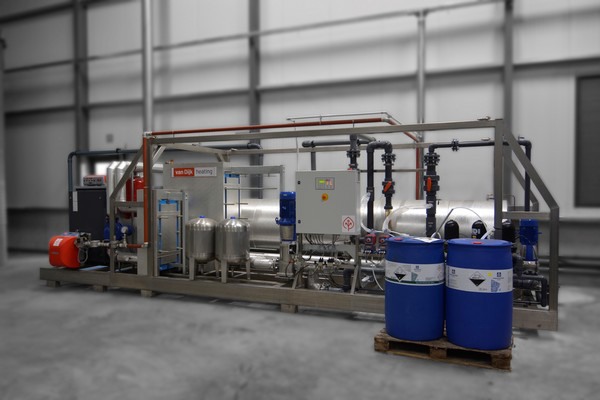During the second last crop rotation, Kwekerij 't Woudt in Schipluiden, the Netherlands, had a brand new Ecoster Hybrid EH5000/50 installed for drain water disinfection. It replaces the Ecoster, which was due for replacement after more than 21 years of loyal service. "Instinctively, I think heat is the surest way to prevent viruses from spreading via the drain water," says Ed van der Knaap, partner. "It's a simple and effective disinfection method."
Exclusive flavorful tomatoes
Kwekerij 't Woudt, owned by Paul van Koppen and Ed van der Knaap, grows very fine, aromatic vine cherry tomatoes with high sugar (Brix >8) and lycopene contents. The product range includes different varieties in the colors red, orange, and yellow, which are available under the Chica and Golden Taste labels. Van der Knaap is proud of his specialty, with enabled the company to make a name for itself back in 2006. The exclusive flavorful tomatoes are in great demand in retail and in the hospitality sector.

Heat and UV
The production area of 6.5 ha (about 16 acres) is divided over two locations in Schipluiden, covering 3 and 3.5 ha (about 7.4 and 8.7 acres). The entrepreneurs attach great importance to sustainable cultivation based on biological control and efficient use of energy, water, and fertilizers. All drain water is disinfected so that it can be reused for irrigation. At the smallest location, this is done by heating it with Van Dijk Heating's Ecoster disinfector. At the slightly larger location, it is done with a UV installation. The old heater was recently replaced by Horticoop Technical Services with a new, natural gas-fired hybrid model with a capacity of 5 cubic meters of water per hour.
Heat exchanger
"That's similar to what we had and more than enough to fully disinfect the amount of drain water in the peak period," he says. "The water is brought to temperature and kept at 85°C for three minutes so that all the viruses, fungi, and bacteria present are inactivated. The built-in heat exchanger cools down the disinfected water and heats up the incoming water so that energy demand stays within limits. That's an important factor with today's gas prices."
Apprehensive about ToBRFV
Although the other nursery uses UV light to disinfect the drain water, the grower says he hasn't had a moment of doubt regarding the choice of a new heater. "Instinctively, I think heat is the surest way to prevent viruses from spreading via the drain water," he says. "UV also works fine, and we have never had any problems with it, but it takes a bit more maintenance. Heating is a simple and effective disinfection method."
The tomato growers are especially apprehensive about ToBRFV. That virus can infect the crop in multiple ways, but by heating the drain water, you can largely eliminate the risk of it spreading through the water system. This also applies to other viruses and micro-organisms, according to independent research by Wageningen University & Research and Groen Agro Control, among others.
For more information: Van der Knaap
Van der Knaap
www.vanderknaap.info
